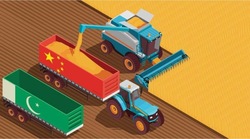Dawn | 12 November 2018
Chinese help in agriculture
by Mohiuddin Aazim
Agriculture in Pakistan will soon begin witnessing the increased footprint of Chinese cooperation. But how much this cooperation will help accelerate our agricultural growth — and at what cost — remains to be seen.
During Prime Minister Imran Khan’s visit to China, Islamabad and Beijing inked a few initial agreements on agriculture; on the basis of which detailed frameworks of cooperation in the field of crops, livestock, fisheries and forestry will be developed and implemented.
Officials say that the Memorandum of Understanding (MOU) signed during Mr Khan’s visit provides the basis for attracting Chinese investment and Chinese technical assistance in all sub-sectors of agriculture.
Officials are tight-lipped about the issue of land acquisition and unclear about financing modalities
“From strengthening the seed sector, increasing crop yield, modernising livestock and fisheries and enlarging our forest cover, there is a long list of areas in which Chinese funds and technical cooperation will be coming in,” says a senior official of the Ministry of National Food Security and Research.
“Whereas it’s true that we’ll develop detailed frameworks for implementation of the Pakistan-China cooperation agreement, it’s wrong to assume that none exists right now. A number of such frameworks are already in place since 2015 — when the CPEC master agreement was signed — and implementation on them continues,” he said.
Officials, however, are tight-lipped about the critical issue of land acquisition in Pakistan by Chinese state-run or private firms for furthering cooperation in agriculture. That was an important feature of the CPEC long-term plan.
After the prime minister’s visit, facts regarding land leasing to the Chinese must now be revealed. Will leasing be allowed? If yes, to what extent? And what else has been agreed to? Silence on this subject can lead to unrest among the farming community and prove counterproductive.
Chinese companies have already been engaged in development of hybrid paddy and wheat seeds in Pakistan. Sinochem Group Agriculture Division, for example, has been running pilot projects at 200 sites in Pakistan including experimental bases and local farms.
A hybrid rice variety developed and cultivated by a Pakistan rice research and exporting company in collaboration with Yuan Longping High-Tech Agriculture Co, has already been exported to the Philippines.
In the seed manufacturing industry, Syngenta Pakistan is aggressively increasing its market share after China took over the Switzerland-based Syngenta in the middle of 2017, industry officials say.
In the follow-up to Mr Khan’s visit to China, delegations of Chinese companies are expected to visit Pakistan. Government officials say details of the Chinese investment commitment in agriculture will become known after the event.
“But it would be naïve to expect that Chinese investment will start pouring into our agriculture sector automatically,” says a Sindh government official working on the province’s long-term agriculture policy.
“Chinese companies that are already here are all working in active partnership with local companies or federal or provincial institutions. They will continue to take this relationship one-notch further every time they decide to increase their level of cooperation. This effectively means we must prepare ourselves to work with them,” he opined.
Sindh is about to unveil its agriculture policy for 2018-2030 and officials working on it say that similar to Punjab, where Chinese and other foreign companies have been actively engaged in agricultural development, Sindh also wants to seek greater international cooperation.
“In fact, we have also developed an external borrowing manual in collaboration with the federal government to enhance governance and transparency levels in foreign-funded projects,” one official who has worked on the manual told this writer.
Increased inter-provincial harmony and improved federal-provincial relationship is a must in promoting the sector.
“We’re going to invite officials from the agriculture departments of all provinces as well as private sector stakeholders to develop an inclusive roadmap for agricultural growth,” a federal government official said adding “we need that roadmap to ensure that the Chinese investment in agriculture fits well into an integrated growth strategy.”
About three years ago, the Pakistani and Chinese governments had identified a couple of areas for cooperation in agriculture and China had promised to build agriculture demonstration centres across Pakistan and supply seeds and machinery to Pakistani farmers.
Authorities have so far not shared with the public how many of such demonstration centres have been built and the arrangement under which the Chinese are supplying seeds and agriculture machinery.
According to an MOU signed in this regard in October 2015, Pakistan was to use Chinese capital, technology and experience to improve irrigation, reduce post-harvest losses and enhance water use efficiency.
Officials with background knowledge of agricultural programmes under CPEC say work is progressing on the above-mentioned and several other areas of agriculture development and poverty alleviation.
They further add that under the current MOU signed, modalities of financing of agricultural projects must have been fine-tuned.
“Currently it is difficult to say how much of the Chinese funding we can expect in state grants and loans, and how much through foreign direct investment of Chinese companies,” a federal government official explained.
Some projects like those of farm-to-market road networks that are connected with storage, packaging and processing units, fall under infrastructure development in CPEC wherein long-term state funding can rightly be expected.
But both state-run Chinese institutions and companies will be involved in other projects like construction of modern slaughter houses or pulses, tea and oilseeds crop cultivation or deepening of agricultural research programmes.












